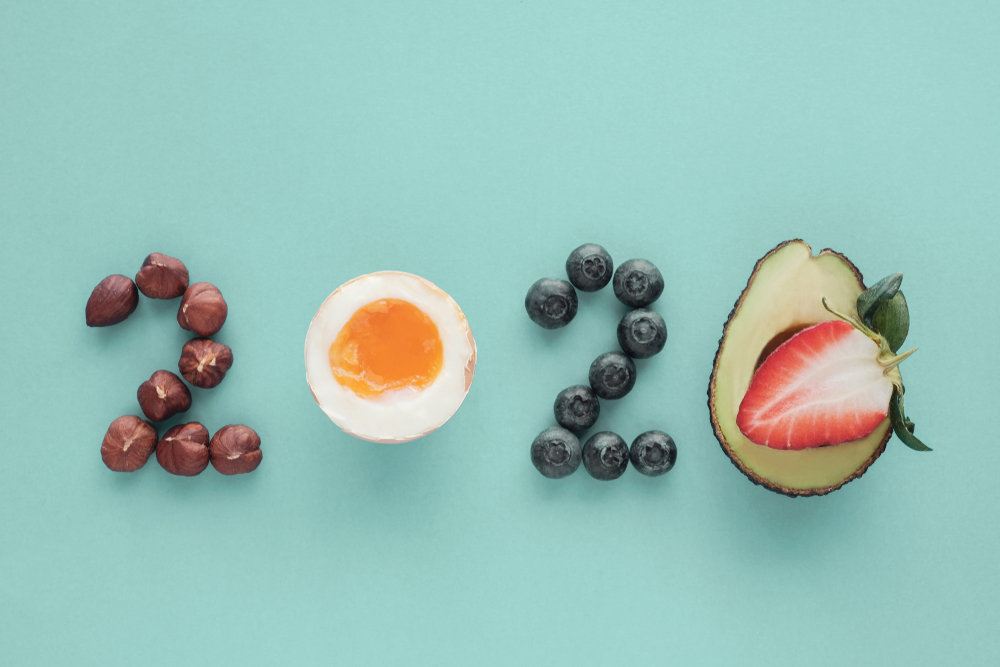Creating Realistic Goals for the New Year

We often like to find a ‘quick fix’ to help reverse the indulgent consuming we feel like we’ve done over the holiday season. We can go to extremes by starving, going on various diets, or using a juice cleanse or fast to help detox. Unfortunately, most (if not all) detoxes use a very restrictive approach to get back to square one, which can lead to more weight gain down the road. It can also make you feel even more lethargic, moody and hangry.
Take a typical juice cleanse which is super concentrated in liquid calories and likely lacking in fiber, protein and healthy fats (3 things that are important for long term satiety). Drinking all of your food can get boring, not to mention that the amount of sugar concentrated in each drink can wreak havoc on your blood sugar levels, hormones, and ultimately, your health. Even if it’s natural sugars coming exclusively from fruit, I always suggest EATING your fruit instead of drinking it.
One of the biggest problems we face post holidays is that we focus too much on setting unrealistic, unmaintainable health and weight goals. To help you succeed in this New Year ahead, treat YOUR detox in a less restrictive, more manageable way to help clear out the old and invite a new balance to your health and ultimately your life. For a ‘real, whole food detox,’ focus on:
1. Adding at least 2-3 different vegetables to your plate twice a day (the more varied colors, the better). They don’t have to be raw or steamed, but can be grilled, roasted, sautéed or baked. Try to fill ¾ of your plate with these mixed veggies
2. Drinking 2 glasses of water with each meal to get in at least 8 cups (2L) of water daily. Research shows that people who consume 2 glasses of water PRIOR to a meal end up consuming 15% less. Consider sprucing up plain water with fresh mint leaves, sliced strawberries, oranges, lemons and limes or opt for unsweetened herbal or green tea
3. Making sure you don’t skimp on good quality protein. Protein is essential for weight loss to help boost metabolism, regulate hormones, and keep you feeling satiated in the long term. It is essential to have protein at EVERY meal (and snack) and include a variety of healthy options like eggs, wild salmon, grass-fed beef, hormone-free chicken and turkey, organic tofu or even nuts and seeds. Aim for 60-80g of protein a day from whole foods (as opposed to protein powders)
4. Skipping a day or two of refined or starchy carbohydrates each week until you’ve reached your health goal. You will be OK without your beans, corn, potatoes, rice, pasta, sweets or breads. Stick with lean proteins, lots of vegetables, water and some healthy fats (1/4 of an avocado or a small handful of unsalted nuts)
5. On the other days, aiming for a couple of servings of fiber to help keep you regular and prevent those potential sugar cravings that may creep up
6. Keeping your overall salt intake to a minimum to help decrease bloat and make the water you consume pass through your system properly
7. Shopping the perimeter of a grocery store and trying to steer clear of any packaged foods
8. Limiting or avoiding caffeine (or latte-type drinks) or alcohol for a week or longer to help your body re-set. You will be FINE sticking with water, herbal tea or seltzer water
9. Meal prepping over the weekend is a great way to plan for the week AND save you money
Implementing even a few of these suggestions will set you on a path towards health and balance. See which ones work for you. As you slowly start to incorporate them into your daily routine you’ll find that you’ll feel better both physically and mentally. Looks like 2020 is going to be your year!
